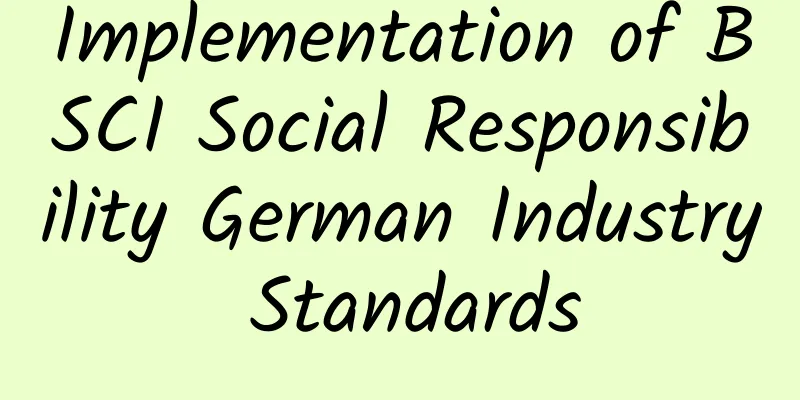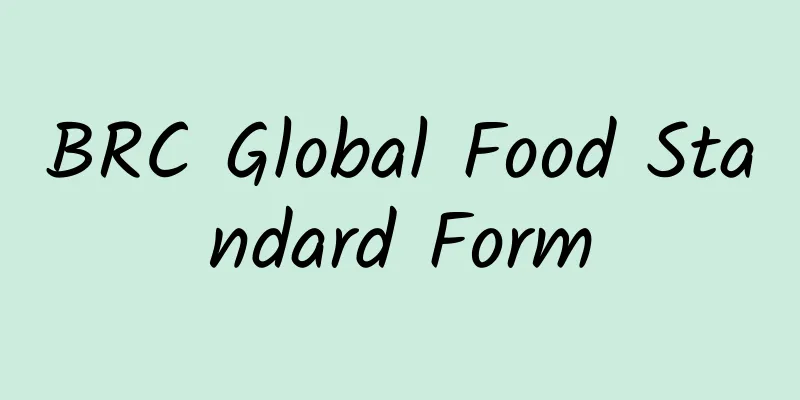Implementation of BSCI Social Responsibility German Industry Standards

|
1. Implementation steps of social responsibility industry norms The German Foreign Trade Retailers Association began to intervene in the issue of social standards for goods in 1999. Before that, this issue was limited to some gestures made by individual companies under public pressure. In order to ease and transfer the pressure, these companies launched the Foreign Trade Retailers Association to coordinate positions, unify standards and develop detailed implementation plans. The social responsibility industry norms proposed by the German Foreign Trade Retailers Association do not seek to interfere with the legal provisions of the supplying countries or regions, but are committed to strengthening cooperation with local governments and institutions. For companies that violate regulations, they are mainly urged to make rectifications. When repeated warnings are ineffective, punitive measures will be considered, including termination of cooperation. The introduction of social responsibility industry norms is not only due to the fact that Western countries are trying to use trade issues to promote their own ideological standards, but also because the West is trying to use social standards to resist the impact of cheap products from third world countries and protect the market in an increasingly competitive market environment. In the process of promoting social responsibility norms, it is mainly enterprises and non-governmental organizations that are taking the lead. The government is temporarily behind the scenes, but has been paying close attention and making necessary coordination. So far, there is no sign that the government and legislative bodies will jump to the forefront in the near future, directly participate in the organization or take extreme measures such as legislative measures to intervene in the social responsibility issues of enterprises. However, it is foreseeable that Western countries will continue to use their domestic management systems and international multilateral and bilateral occasions, including WTO negotiations, to sell their "social and environmental standards" and other non-trade factors, which should attract our attention and make corresponding preparations. III. The Implementation of German Corporate Social Responsibility Industry Standards The German Foreign Trade Retailers Association does not have many members, but it includes almost all large commercial chain groups and retail enterprise groups in Germany. Kashidat Kwaner Group is one of the earliest companies to introduce "social standards" and joined the German Foreign Trade Retailers Association's social responsibility industry standard system in 2003. Kobe, manager of the company's environmental and social policy department, said, "We do not want to act as the world's police. The implementation of social standards is mainly to respond to social and public calls and assume corresponding social responsibilities. In the final analysis, the improvement of corporate production conditions will also help improve corporate labor productivity and product quality." Puma of Germany established an environmental and social department a few years ago with 7 staff members, who are mainly responsible for checking the implementation of corporate social responsibility standards. The company also requires its suppliers to designate full-time environmental and social standards inspectors to cooperate with the work. In 2003, Puma terminated its cooperation with 33 partners due to environmental and social standards issues. Paul Hartmann is a large enterprise producing industrial textiles. Since 1998, the board of directors has discussed and decided to include the content and requirements of social standards in the terms of commercial contracts, and stipulates that the contract can be terminated if the rectification fails to meet the requirements within two warnings and within the deadline. The German ZAPF CREATION AG mainly produces dolls. It began to invest in China in the 1980s. Currently, 95% of its products are produced in China. Since 1995, the company has taken the initiative to introduce social standards, called "Code of Business Practices", and is also one of the earliest companies in Germany to introduce social standards. In 2003, the International Toy Association formulated the International Toy Social Standard, which stipulates that suppliers must accept verification by independent institutions and inspectors. ZAPF is one of the first companies to accept and join the International Toy Social Standard System. 4. Several social and environmental labels on the German market 1. TransFair The label is issued by the Cologne Fair Trade Association. The association is recognized and supported by more than 40 social organizations and groups. The Fair Label is mainly used for primary foods such as coffee, tea, cocoa, honey, sugar, juice, bananas and desserts produced in developing countries. Currently, there are 87 companies in Germany that provide products with the "Fair Label", including Kashidat.Kwanle, Starbucks, etc. Such products are sold in more than 22,000 supermarkets in Germany (webpage: www.transfair.org ). 2. Carpet label (RUGMARK) Mainly used for handmade carpets produced in India, Nepal and Pakistan. Carpets with the label prove that there is no exploitation of child labor in the production of the carpet. In 2002, Germany imported 20 million euros of carpets with the RUGMARK label. So far, a total of 2.5 million imported carpets in Germany have been awarded the RUGMARK label (carpet label website: www.rugmark.de ). 3. Flower Label The label is a social and environmental label launched by the German Flower Wholesalers and Importers Association in conjunction with some human rights and environmental protection organizations, mainly for Kenya, Colombia and other flower producing countries. Producers applying for the label must meet the organization's requirements in terms of human rights, environment, labor, health, safety protection and workers' livelihood security. Currently, flower products with the label are sold in more than 700 flower shops in Germany (flower label website: www.flower-label-program.org ). 4. Fair Trade Labelling Organization (FLO) The Fairtrade Labelling Organization (FLO), located in Bonn, is the world's largest social standards certification organization. The organization is entrusted to regularly visit more than 40 developing countries around the world to inspect the production and labor conditions of suppliers in accordance with the core standards of the International Labor Organization. At present, the organization has established cooperative relations with 17 social standards organizations and institutions around the world (FLO website: www.fairtrade.net ). 5. SA8000 certification SA8000 certification is a social standard certification system supported and participated by many non-governmental organizations, economic and scientific research institutions around the world and implemented by the International Social Accountability Organization (SAI). Its certification content includes: no child labor, no forced labor, no psychological and physical punishment, no discrimination, and compliance with working hours restrictions; employees enjoy the right to freedom of association and collective bargaining, safe and healthy working conditions and minimum living security, etc. The SA8000 certification process is complex and generally covers the following steps: A. The applicant enterprise shall establish a social management system; V. Relevant trends of the international community on the issue of social standards for commodities 1. In the late 1990s, UN Secretary-General Kofi Annan launched a so-called "Global Action Plan" (Global Compact), which is based on the UN human rights conventions, ILO standards and the "Rio Declaration" and is committed to improving human rights, labor conditions and the global environment. So far, more than 1,000 companies around the world, including more than 20 companies such as Allianz, BASF, Lufthansa, Volkswagen, and DaimlerChrysler, have actively participated in the plan. 2. In 2000, the Organization for Economic Cooperation and Development (OECD) issued the "Code of Conduct for Multinational Enterprises", calling on member countries' multinational enterprises to assume social and legal responsibilities in their overseas business activities, and to maintain and comply with internationally recognized ecological and social standards. Each member country has established a liaison agency to submit annual reports on the implementation of the "Code" and is responsible for handling complaints from all walks of life. The German liaison agency is located in the Federal Ministry of Economics and Labor, and has established an "OECD Code Working Group" with the participation of various ministries, labor and management, and non-governmental organizations. 3. In 2000, the International Labor Organization issued a revised "Statement of Three Principles Concerning Multinational Enterprises and Social Policy", which formulated a code of conduct for enterprises, governments and all sectors of society in terms of labor and employment. Prior to this, the "Statement on Fundamental Principles and Rights at Work" issued by the International Labor Organization in 1998 has become the basic norm for countries to implement labor protection and social standards. 4. In 2003, the Commission on the Promotion and Protection of Human Rights, a subsidiary body of the United Nations, drafted the "Draft Standards on the Human Rights Responsibilities of Transnational Corporations and Other Enterprises" and submitted it to the United Nations Human Rights Commission for discussion. 5. In 2001, the European Commission submitted the "European Corporate Social Responsibility Framework Green Paper" to the European Parliament, and in 2002 established a "Multi-party Social Forum" attended by representatives from all walks of life to establish a dialogue and information exchange mechanism on corporate social responsibility within Europe. Currently, the European Parliament is consulting on the social standards for regulating the business activities of European multinational groups in developing countries and the feasibility of implementing a corporate environmental and social behavior reporting system. Not long ago, the European Foreign Trade Association launched an activity called "BSCI Business Social Compliance Initiative", which aims to establish a universal monitoring system for implementing commodity social standards in Europe. The association has invited other European economic organizations and industrial and trade enterprises to join the system, and welcomes industrial and trade enterprises outside Europe to participate. According to the German Foreign Trade Retailers Association, European foreign trade and retail enterprises are not willing to see the EU adopt legislative means to form legal documents on social standards issues, but are committed to fulfilling the social responsibilities that enterprises should bear through industry self-discipline on the one hand, and on the other hand, trying to avoid new barriers and obstacles to international trade caused by social responsibility issues. |
<<: Zhejiang's minimum wage standard exceeds that of 12 provinces, ranking first
>>: China responds to accusations in 2010 U.S. human rights record
Recommend
What is Yingke? What are Yingke's advantages?
What is Yingke? Yiwu Yingke E-commerce Co., Ltd. ...
Some things to pay attention to when inspecting Avon factories
Some things to note when inspecting Avon's fac...
The most comprehensive guide to applying for "climate-friendly" projects (Part 2)
2. Look for test reports and carbon neutrality ce...
How to set up eBay to attract buyers' attention?
1. Simplicity is beauty The most important of all...
Reporter at the scene: Bamboo and corn can be made into environmentally friendly organic fabrics
On-site news Bamboo, soybeans, corn, milk, coconu...
What types of Yahoo stores are there?
What types of Yahoo stores are there? Simple vers...
What are eBay's guidelines regarding duplicate listings?
To ensure that buyers see a wide selection from a...
How is Kahan International Logistics? What are the advantages of Kahan International Logistics?
How about Kahan International Logistics? Guangzho...
my country's implementation of compulsory product certification system has achieved remarkable results
"Brother, I want to buy an iPhone 4S, but th...
Rubicon Project — online advertising technology company
What is the Rubicon Project? RubiconProject is an...
GOTS Global Organic Textile Certification Audit Key Points
What are the key points of GOTS global organic te...
The most comprehensive guide to opening a cross-border e-commerce store - eBay
What I want to talk about today is eBay, one of t...
Introduction to the European Cutting Tool Safety Organization (OSA Certification)
Introduction to the European Organization for the...
HACCP system certification and its application criteria (Part 2)
HACCP system certification and its application cr...
What is FuChain? What are the functions of FuChain?
What is FuChain? Shenzhen Fulian Software Technol...









